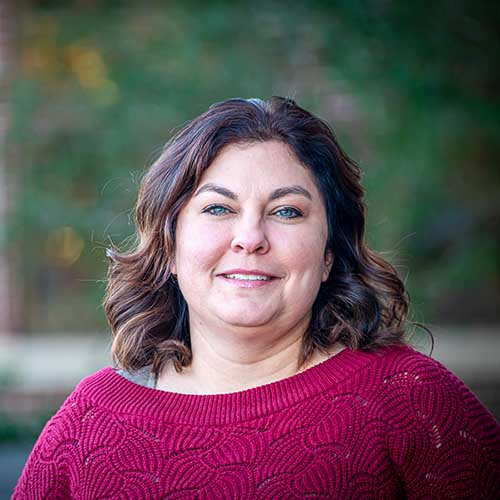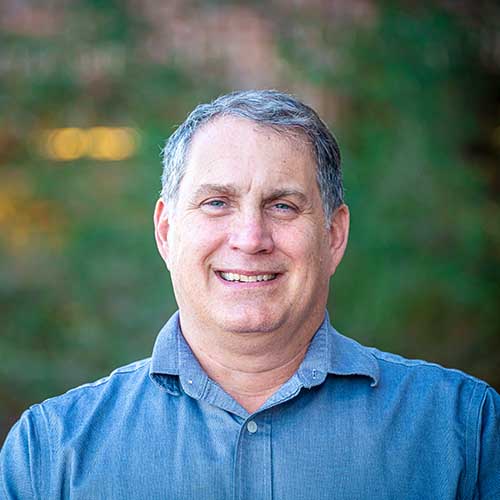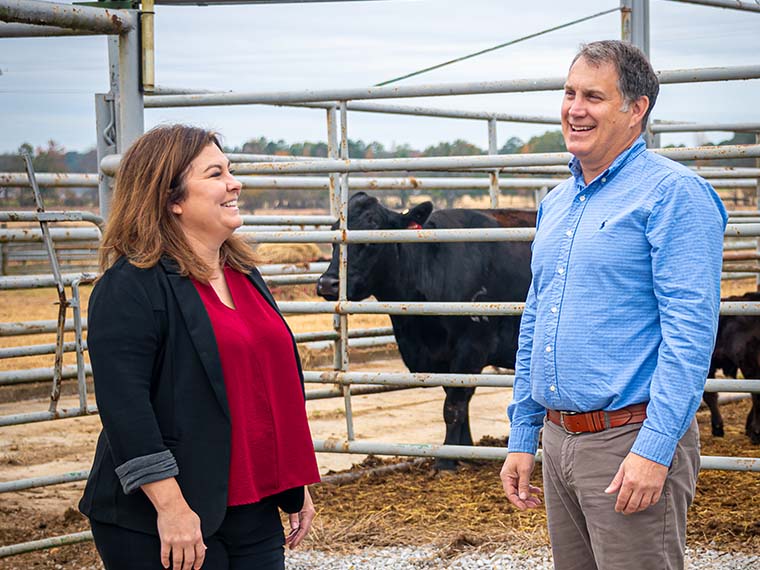The information presented on this page may be dated. It may refer to situations which have changed or people who are no longer affiliated with the university. It is archived as part of Mississippi State University's history.
In this issue of MAFES Discovers, two fairly new department heads discuss their vision for animal production at Mississippi State. Dr. Christy Bratcher began as head of the Department of Animal and Dairy Sciences on July 1. Dr. Ken Macklin began serving as head of the Department of Poultry Science on January 1. These leaders represent the land grant mission of teaching, research, and service with appointments in the College of Agriculture and Life Sciences, Mississippi Agricultural and Forestry Experiment Station, and the MSU Extension Service. One of the questions they will address regards the concept of One Health. According to the Centers for Disease Control and Prevention, "One Health is a collaborative, multisectoral, and transdisciplinary approach—working at the local, regional, national, and global levels—with the goal of achieving optimal health outcomes recognizing the interconnection between people, animals, plants, and their shared environment."
Dr. Christy Bratcher
Describe your vision for the department.
My vision for the department is to continue to provide the best hands-on education for our students while growing our research portfolio and providing solutions to challenges in a changing world.
How does animal and dairy sciences (ADS) address One Health?
Dr. Holley Muraco, an assistant research professor stationed at the Coastal Research and Extension Center, is focused on marine One Health. Dr. Muraco has an ADS background and does some very interesting work with marine mammals and health-related aspects that have a much broader impact than just the health of those animals. She is a great addition with her background in zoos and aquariums and is developing some interesting hypotheses in conjunction with our microbiome expert, Dr. Peixin Fan, assistant professor in animal and dairy sciences. Dr. Fan also has other collaborations within and outside of the department studying health-related impacts of the environment.
How is ADS deploying agricultural autonomy?
Dr. Marcus McGee, assistant clinical professor, is the faculty member in our department working most closely with agricultural autonomy. He has been working with an autonomous company in herding cattle at the dairy and a few other applications for technological advancement in autonomous agriculture.
Discuss graduate research.
We would like to recruit more graduate students. ADS has a very strong physiology research program. The amount of funding that Dr. Caleb Lemley has been awarded has helped him to build a strong program and be able to support graduate research with stipends. I hope to see increased research activity that will allow other programs to thrive by training graduate students. The ADS department has a Master of Agriculture, which is a unique program that allows students to complete a non-thesis degree online. This is an attractive option for individuals that may already have a career and are seeking an advanced degree that can be completed without the traditional expenses associated with moving to a college town to take face-to-face courses. Dr. Kelsey Harvey is our graduate coordinator, and she helped write a grant to secure funding from the MSU Graduate School to develop some recruitment materials, attend recruiting events, and even to pay some fellowships for new graduate students in our program. I look forward to seeing the outcome of those efforts.
Discuss graduate research.
We would like to recruit more graduate students. ADS has a very strong physiology research program. The amount of funding that Dr. Caleb Lemley has been awarded has helped him to build a strong program and be able to support graduate research with stipends. I hope to see increased research activity that will allow other programs to thrive by training graduate students. The ADS department has a Master of Agriculture, which is a unique program that allows students to complete a non-thesis degree online. This is an attractive option for individuals that may already have a career and are seeking an advanced degree that can be completed without the traditional expenses associated with moving to a college town to take face-to-face courses. Dr. Kelsey Harvey is our graduate coordinator, and she helped write a grant to secure funding from the MSU Graduate School to develop some recruitment materials, attend recruiting events, and even to pay some fellowships for new graduate students in our program. I look forward to seeing the outcome of those efforts.
Discuss undergraduate research.
Undergraduates are vital to our success in accomplishing the research mission and answering the research questions that we have in ADS. It also aids in training the next generation of scientists and allows students to see that there are so many opportunities as animal and dairy scientists.
Discuss the synergy between the poultry science and animal and dairy sciences departments.
Dr. Macklin and I have known each other for a long time and have had research collaborations in the past. I hope to continue to grow the collaborative spirit within our departments. We have researchers that can complement each other, and we also have courses that are taught in our departments that we can capitalize on increasing enrollment by adjusting the content in the slightest ways to be applicable to poultry and livestock. I am also excited for the opportunity to hire a faculty member with a focus on livestock and poultry health and diseases. This will be a link with a vested interest in both departments that can help to bring us all together.
Discuss other cross-departmental or cross-college collaborations you're excited about.
I am excited for any collaborations across campus. I always say that the crazy idea you jot down on a napkin while socializing with peers from other areas of expertise always end up being the most successful ideas in the end. I want to encourage our faculty to think outside the box and come up with those 'crazy ideas'.
You both have fairly new building complexes. Are there any facility expansions/improvements on the horizon you'd like to mention or that you're hoping to work toward in the future?
The facilities that we have for the ADS building and the Meat Science and Muscle Biology Lab are phenomenal! We look forward to getting started on our livestock assessment laboratory soon. We also have maintenance projects at the MAFES H.H. Leveck Animal Research Center (South Farm) and MAFES Bearden Dairy Research Center. I created a Facilities Improvement Committee made up of staff from each of our different units. I have tasked this committee with making a visit to a different unit each month and creating a list of things that need to be improved. I am hoping that having a few new sets of eyes to look at each other's facilities will help us to pay attention to the details that are sometimes overlooked when you see it every day.
Dr. Ken Macklin
Describe your vision for the Department of Poultry Science.
This department has a lot of potential. Over the summer, we fleshed out a departmental vision to utilize the department's young, diverse faculty, strong alumni connections, and industry base to address today's global food security issues. This will be accomplished by graduating quality undergraduate and graduate students and producing research that can be directly beneficial to poultry producers. I am excited to be given this opportunity to help shape this department. I know that once we have all the pieces in place, we can do great things!
How does poultry science address One Health?
A misconception of those less familiar with agriculture is that people in agriculture do not fully believe in or work toward One Health. However, the truth is much different than that! In poultry science, with our partners across campus and the state, we work toward making poultry production more sustainable by looking into alternative sources of energy, better waste management, more efficient poultry house design, and better management of the birds and the farm. It's important, though, that these changes do not cause the producer any excessive expenses and, in the end, will help them become more profitable. Other areas include optimizing the diets of the birds, which will cause less feed to be wasted as well as less manure being produced. Managing the health status of the birds is also important, in that a healthy bird will lead to a safe and nutritious product that is safe for the consumer.
Discuss how you've integrated your research expertise into your current role.
I have been involved in investigating ways we can improve on-farm food safety; better understanding the relationship between eggshell quality and hatch, and what can be done to improve both; developing novel technologies to control insects that carry pathogens from one flock to another; and sharing my knowledge of bacteriology and parasitology, and, when needed, helping on the various projects involving those microbes.
What are you most looking forward to in the next year?
I am excited that we will be bringing in three new faculty members into the department as well as a faculty member that will be shared with animal and dairy sciences. I think that these four people will help shape and achieve the vision that we, as a department, have outlined.
Discuss graduate research.
One of the first things I noticed about our poultry science graduate students is how well they get along and are always willing to help one another. This collaborative spirit begins with the faculty. Most of this stems from us being a small department. Our graduate students have many opportunities to explore other areas of research beyond their study area, which will benefit them in their future endeavors. We hope to expand existing graduate student opportunities through our faculty hires and facility expansions.
Discuss undergraduate research.
Undergraduate research is important in several ways. It gives the undergraduate student the opportunity to see what it takes to perform an experiment, enriching their MSU experience, demonstrating what it takes to produce innovation, and providing practical skills they can carry into the workforce. It also may foster in the student an interest in pursuing a graduate degree. Like graduate opportunities, new faculty and expanded facilities will also increase undergraduate opportunities.
Discuss the synergy between the poultry science and animal and dairy sciences departments.
Dr. Bratcher and I collaborated on several projects when we were at Auburn University. Between the new joint hire between poultry and animal and dairy sciences as well as both of us getting settled into our roles and learning our faculty, I predict that there will be projects on the horizon.
Discuss other cross-departmental or cross-college collaborations you're excited about.
Two strong ongoing partnerships are with the Department of Agricultural and Biological Engineering and the USDA-ARS poultry unit here in Starkville. With that said, there are many more opportunities that need to be explored here in the college and across the university.
You both have fairly new building complexes. Are there any facility expansions/improvements on the horizon you'd like to mention or that you're hoping to work toward in the future?
The one we have been working toward for the past several years is a teaching feed mill. This will be a great resource for the department as well as for the feed milling sector in that students can be trained in all aspects of that industry. In addition, people working in feed mills can be shown the latest's innovations, or even given a refresher on feed milling practices through workshops and other training that can be held there. The second one is a research bird facility that we have labeled our One Health building in which we can expand our work with biosecurity level 2 organisms such as Salmonella, E. coli, Clostridium perfringens, and Campylobacter. Understanding these bacteria is important for both human and bird health.
Behind the Science

Dr. Christy Bratcher
Professor and Head Department of Animal and Dairy Sciences (ADS)
Education: B.S., M.S., Animal Science, University of Florida; Ph.D., Animal Science, University of Missouri
Associate dean of research and graduate students at Texas Tech University's College of Agricultural Sciences and Natural Resources; Director of Auburn University's Food Systems Institute; quality assurance in the beef cattle industry

Dr. Ken Macklin
Professor and Head Department of Poultry Science
Education: B.S., M.S., Biology, Northern Illinois University; Ph.D., Poultry Science, Auburn University
Research professor and extension specialist at Auburn University

